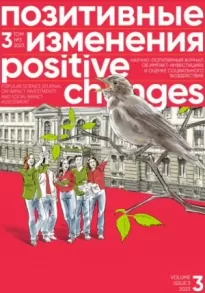Позитивные изменения. Том 3, № 3 (2023). Positive changes. Volume 3, Issue 3 (2023)

- Автор: Редакция журнала «Позитивные изменения»
- Жанр: Научная литература / Газеты и журналы
- Дата выхода: 2023
Читать книгу "Позитивные изменения. Том 3, № 3 (2023). Positive changes. Volume 3, Issue 3 (2023)"
PRIORITIES FOR ACTION
Reaching out to society at large and opening up for co-creation will be a continuous ambition for universities in this decade.
To fully realize this vision of universities without walls, a coordinated approach and ownership among the main stakeholders are needed. These include university leadership, students and staff, funders and policy makers. The EUA suggests three priority areas of work, i.e., steps that can be taken today to bring the future closer: reform academic careers, promote interdisciplinarity, and strengthen civic engagement.
REFORM ACADEMIC CAREERS
The reform should be acknowledged and supported by all stakeholders through the following actions:
• Using a broader set of evaluation practices for academic careers, which include a wide definition of impact, beyond traditional bibliometric indicators;
• Promoting further parity of esteem between different career paths, including parity of esteem between research and teaching;
• enabling and valorizing Open Science[160] in career and research assessment;
• incentivizing activities with different forms of impact, including innovation or citizen science;[161]
• making academic careers less precarious and more attractive as life choices in order to develop and retain talent;
• providing more flexibility for academic careers, for switching jobs more easily between academia and other sectors, such as start-ups, industry or public administration. Researchers with job experience outside academia must have access to university careers.
PROMOTE INTERDISCIPLINARITY
Interdisciplinary approaches must be better used for meeting societal challenges across university missions. While disciplines must remain important in order to organize and expand the knowledge production at universities, interdisciplinary approaches must be promoted by:
• recognizing interdisciplinary engagement in academic assessment and reward schemes;
• implementing institutional accreditation[162] to complement discipline-based program accreditation;
• making interdisciplinary teaching part of the professional development of academic staff and supporting academic staff from different disciplines in working together.
STRENGTHEN CIVIC ENGAGEMENT
Universities must support civic values. They can do this by:
• supporting the members of the academic community in using their academic freedom to contribute to public debates, encouraging open and evidence-based discussions, countering misinformation and falsehoods and explaining the lack of finality in scientific judgements (that is, the concept that any scientific judgement can be modified or canceled — ed. note);
• promoting opportunities for learners to actively engage in societal projects and debates that build bridges and foster understanding throughout society;
• promoting civic engagement across the university missions, developing participation, respect for diversity and open debate as a common value across the institution;
• providing a continuous reflection on European identity and culture, as well as their contribution to a global world.
Like every institution, universities need a strategy, to visualize what they aspire to be, to see their overarching goals and the steps they need to take in order to get there. “Universities without Walls” is offered as a support, to give university leaders and their academic communities an insight on how universities can develop, respond to challenges and build a society of knowledge in the coming years. Today’s universities are expected not only to address educational and scientific challenges, but also to participate actively and responsibly in society. This need for engagement is understood all across the world. This means that a strong, autonomous university actively working with society is the future we should strive for, and which we should join our efforts for.





